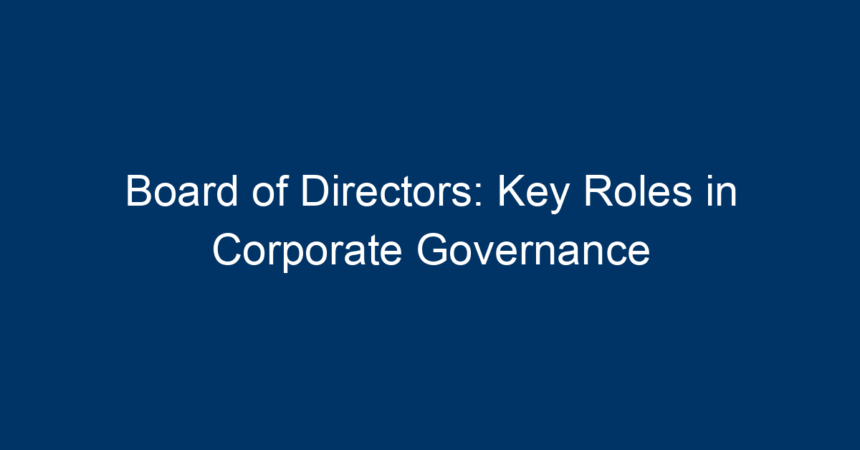In today’s complex corporate landscape, the Board of Directors plays a pivotal role in steering organizations towards sustainability and success. As the governing body of a company, the board’s influence impacts strategic decision-making, financial health, and corporate governance practices. Understanding the key roles and responsibilities of the board of directors is essential not only for existing members but also for stakeholders and aspiring directors. This article delves into the critical functions the board serves, its structure, the importance of diversity, and best practices to enhance their effectiveness.
1. Understanding Corporate Governance
Corporate governance refers to the systems, principles, and processes by which corporations are directed and controlled. At its core, it involves the relationships among various stakeholders, including shareholders, management, and the board of directors. Effective corporate governance ensures that a business operates transparently and ethically, balancing the interests of shareholders with those of other stakeholders.
Why Corporate Governance Matters
Good corporate governance enhances a company’s reputation, fosters trust with investors, and can lead to higher financial performance. It minimizes risks of fraud and mismanagement, ultimately benefiting all stakeholders involved. For these reasons, the role of the board of directors in establishing and maintaining governance standards is indispensable.
2. Composition of the Board of Directors
The effectiveness of the board of directors largely relies on its composition. A well-balanced board often includes a mix of internal and external directors, each bringing different perspectives and expertise.
Internal vs. External Directors
-
Internal Directors: Typically, these are members of the company’s management team, including the CEO and CFO. Their unique insights into daily operations provide valuable context during decision-making.
- External Directors: Also known as independent directors, they are not part of the company’s day-to-day operations. Their objectivity helps ensure unbiased governance and reinforces accountability.
Committees within the Board
Many boards form specialized committees to focus on specific areas:
- Audit Committee: Oversees financial reporting and compliance.
- Compensation Committee: Reviews executive compensation and benefits.
- Nominating Committee: Responsible for identifying and recommending board members.
By establishing these committees, boards can function more efficiently while ensuring thorough oversight in critical areas.
3. Key Roles and Responsibilities of the Board of Directors
The functions of the board of directors can be broad and multifaceted. Here are several key responsibilities they undertake:
Strategic Oversight
One of the board’s primary roles is to oversee the organization’s strategic direction. This involves:
- Reviewing and approving the company’s long-term goals.
- Evaluating strategic plans proposed by management.
- Monitoring industry trends and competitor actions to adapt strategies accordingly.
Risk Management
In today’s business environment, risk management is more critical than ever. The board must:
- Identify potential risks (operational, financial, legal, etc.).
- Establish risk management policies and procedures.
- Ensure that appropriate measures are in place to mitigate identified risks.
Financial Accountability
The board bears ultimate responsibility for the financial health of the organization. This entails:
- Reviewing and approving annual budgets.
- Monitoring financial performance against targets.
- Ensuring transparency in financial reporting.
Ensuring Ethical Conduct
Ethical governance is a cornerstone of corporate governance. The board must:
- Set the tone for ethical guidelines and corporate values.
- Implement structures for reporting unethical behavior.
- Ensure compliance with relevant laws and regulations.
Performance Evaluation
Regular evaluation of the board’s performance and that of executive management is vital. This process includes:
- Setting performance metrics and benchmarks.
- Conducting annual evaluations to assess achievement against these metrics.
- Addressing areas needing improvement proactively.
4. The Importance of Diversity on the Board
Diversity within the board of directors extends beyond gender and ethnicity; it encompasses varying experiences, skills, and perspectives.
Enhancing Decision-Making
A diverse board can offer a broader range of ideas and solutions to challenges, leading to better decision-making and innovation. Diverse perspectives can also lead to better understanding and representation of different customer segments.
Fostering Trust and Reputation
As consumers become increasingly attuned to issues of diversity and inclusion, a diverse board can enhance a company’s reputation and foster trust among employees, customers, and investors.
5. Best Practices for Effective Board Governance
To ensure the board of directors functions effectively, here are several best practices to consider:
Regular Training and Development
Ongoing education about industry changes, governance best practices, and leadership skills can equip board members to make informed decisions.
Clear Communication Channels
Open lines of communication between the board and management foster transparency and encourage collaboration. Regular updates and discussions should be prioritized.
Conducting Succession Planning
Having a clear succession plan for key positions, including that of the CEO, is essential. This minimizes disruptions and ensures continuity in leadership.
Transparency and Accountability
Maintaining a culture of transparency and accountability within the board can lead to greater trust from stakeholders. Publicly disclosing decision-making processes and outcomes reinforces commitment to good governance.
Conclusion: Actionable Insights for Boards of Directors
The board of directors is undoubtedly the helm of corporate governance, navigating the complexities of business while safeguarding stakeholder interests. Here are key takeaways for current and prospective board members:
-
Prepare for Strategic Oversight: Engage actively with management to understand the organization’s strategic challenges and opportunities.
-
Embrace Diversity: Advocate for diverse representation on the board to enrich discussions and decision-making processes.
-
Stay Informed About Risks: Regularly assess and update risk management policies to address emerging threats in the business environment.
-
Commit to Continuous Learning: Invest in ongoing education for board members to stay abreast of industry trends and governance best practices.
- Foster a Culture of Accountability: Promote transparency in decision-making and ensure everyone involved is held accountable for their actions.
By understanding the vital roles and responsibilities of the board of directors, organizations can enhance their corporate governance practices, ensuring long-term success and sustainability. As businesses continue to evolve, the board’s adaptive leadership will remain crucial in facing both challenges and opportunities in the corporate sphere.




